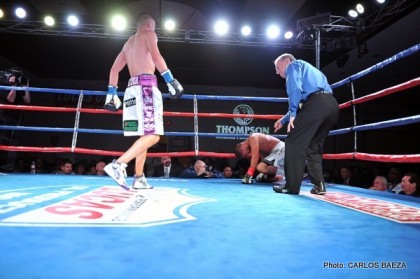 Some highly regarded boxing experts and pundits are still using the term “amateur” in a derogatory sense towards boxers. They fail to notice that the word has a totally different meaning when applied to boxing and appear to be the amateurs per se.
Some highly regarded boxing experts and pundits are still using the term “amateur” in a derogatory sense towards boxers. They fail to notice that the word has a totally different meaning when applied to boxing and appear to be the amateurs per se.
The amateur sanctioning body AIBA is addressing such issues by renaming Amateur boxing to Olympic boxing and dropping the word “amateur” from all official events. They are changing the rules and are obviously aiming to merge the pro and amateur codes with very loose differentiations between the two. Like all sanctioning organizations, they are riddled by their own moral and political issues. They’d better get their scoring system right instead of renaming and depersonalizing the good old mother of boxing. If I used to be a middleweight amateur (75 kg/165 lbs) back in the day, now I have to change all my old papers to super-middleweight Olympian? Nonsense (forget about it).
Amateur boxing originated as an alternative to prize-fighting that can be practiced by a wider range of social groups. Historically boxing used to be an elite pass time for upper and middle class gentleman and a profession for a small number of pugilists. Amateur boxing was perceived as a safe way for the youth in schools, universities, the military and the navy to participate in boxing in a pure form and keep fit. Just like in prize fighting, all amateur champions with very few exceptions came from the urban poor. The gentry practicing the noble art of self defense were no match for the lean and mean hungry commons. The working class sort of had its revenge but now it seems the name of the game will be changed again.
It is fashionable for some analysts to claim that professional and amateur boxing are different sports. Conditioning, tactics, dynamics, etc. are certainly different but the basics are the same. Fighting for 3 rounds is different than fighting for 12 rounds but it is not much easier. In fact amateur boxing requires more technical proficiency, discipline and form than prize fighting. In the amateurs you can’t choose your opponents and you don’t know who you’ll fight next. You can not prepare for a specific opponent and often you have to spar with bigger opponents. Performance enhancers are of absolutely no use in the amateur code and can even be a setback. Boxing is a skill/craft sport and there is no medicine for that. Some key elements like punch power and hand speed are determined by genetics and you can’t train or boost them. PEDs could even send you in the upper weight class without any new assets and this is rarely a good idea. Other stimulants that are known to open up the alveoli and improve stamina for pros are still useless in a 3 round bout.
Amateur boxing is like a huge database that stores all boxing knowledge. Some of the moves and drills amateurs use are not sustainable in a long pro bout while every technique from professional boxing exists in amateur boxing as well.
Having a solid amateur background is very important for a pro. In fact prize fighting today is ruled by ex-amateurs – Andre Ward, Guilermo Rigondeaux, Floyd Mayweather, Gennady Golovkin, Klitschko, Sergey Kovalev, etc. Even when it seems all hope is lost for the future of the industry, there are good amateurs lurking in the deep and surfacing like Vasyl Lomachenko.
Amateur boxing has nothing to be ashamed of and committing seppuku can be postponed. It has been a platform where the best fight the best and no amateur could fool all the fans all the time. Rocky Marciano and Floyd Mayweather lost several times as amateurs too; they couldn’t choose or influence their opponents.